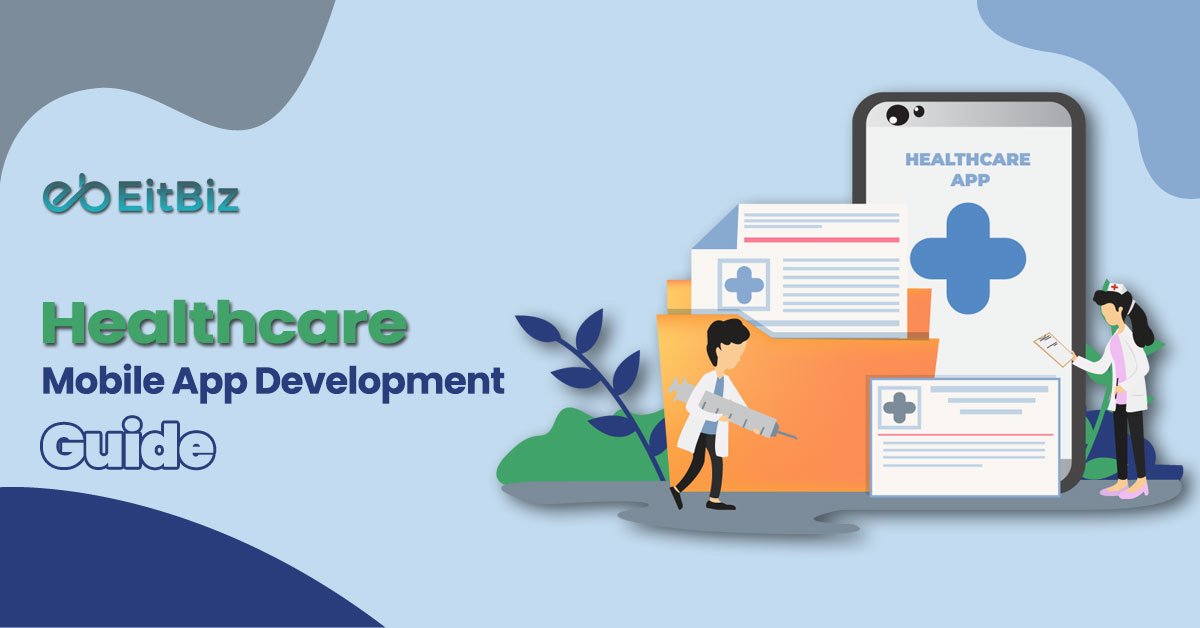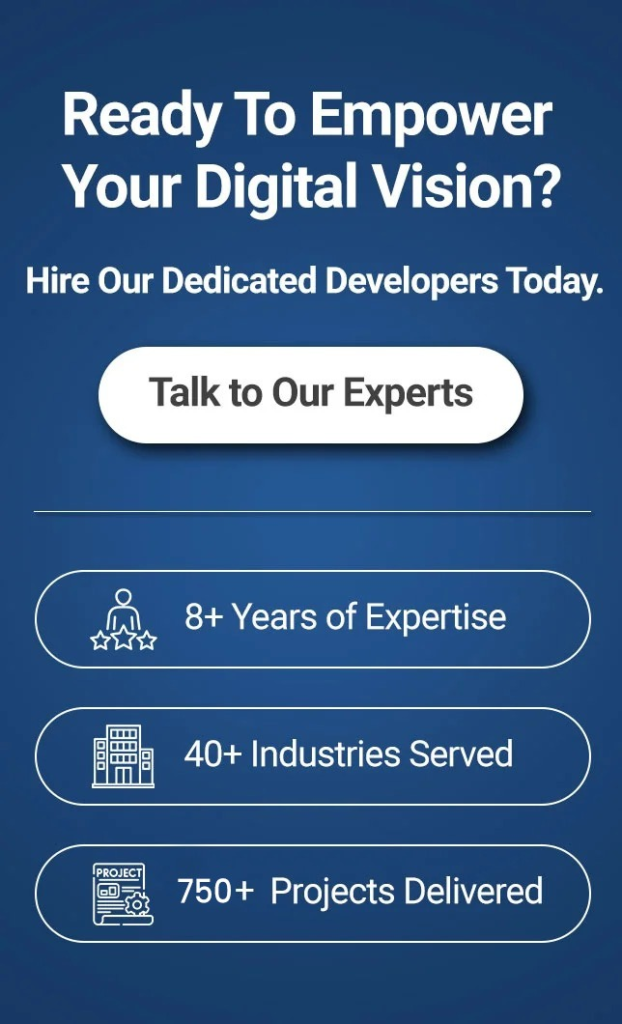Let’s start with some jaw-dropping facts related to “Healthcare App Development”!
- The global health mobile app market size will reach $111.1 billion by 2025 and is likely to grow with a significant CAGR (compound annual growth rate) of around 38.26%. (Source: Zion Market Research).
- Nearly 60% of users have installed a healthcare app on their device at least once. (Source: Mobius MD).
- More than 70% of patients said that they understand the importance of healthcare apps as per research conducted by Accenture.

Sounds surprising, doesn’t it?
And thus, it’s no secret why businesses are going crazy over “Healthcare Mobile App Development”!
Considering such astonishing facts & figures, mobile healthcare apps, also known as mHealth apps, are an exceptional way to make the lives of patients and doctors easier.
But here’s the deal!
While healthcare application development is an incredible way to improve patient care and satisfaction, 8 out of 10 healthcare mobile apps fail to meet users’ expectations and the reasons are endless.
And as a business, you cannot avoid to capitalize on such a lucrative opportunity, can you?
Well, in this post, we’ll dive into the complete healthcare mobile app development!
Table of Contents:
What is Healthcare Application Development?
To put it simply, healthcare apps are dedicated mobile apps designed to facilitate communication between patients and doctors for quality output. Remember that there are many types of healthcare apps and each type has its significance. From enhanced health tracking and monitoring to easy and faster delivery of medical solutions, these apps are an excellent way to improve the lives of patients and doctors.
Moreover, healthcare application development includes both — patients and healthcare professionals. It simply means that doctors and hospital staff can use medical apps to deliver a wide range of services to improve their operational efficiency. These apps also come with built-in tools like telemedicine, practice management, medical coding, and more.
With complete healthcare mobile app development services, you can;
- Enhance communication between healthcare providers & patients
- Improve patient care
- Streamline healthcare processes
- Facilitate access to medical information & services

Since there are multiple healthcare mobile apps on the market, how can you tell which one of your business goals is the best?
Remember that a healthcare app good for your competition might not be an ideal solution for you or vice versa.
That’s why, you should first know what kind of app you want to build before you embark on your journey to healthcare app development.
What are the Types of HealthCare Apps?

Here are the different types of healthcare mobile apps.
- Telemedicine Apps
These kinds of apps are quite popular and enable remote consultations between patients & healthcare via voice calls, messaging & video calls. Furthermore, these apps help doctors to monitor patients’ health without asking them to meet in person.
- Fitness & Wellness Apps
Fitness apps, on the other hand, are designed to promote healthy lifestyles via wellness tips, personalized workout routines, fitness tracking, and more. Furthermore, individuals can easily integrate these apps with their smart devices to calculate their calorie intake, heart rate, steps taken in a day, sleep cycles, and more.
Note: If you don’t have time to build dedicated fitness & wellness apps, hire the best healthcare app development company to help you out.
- Medication Management Apps
These are kind of the most undervalued healthcare apps that have now gained significant popularity among people with busy schedules. These apps let users manage their medications, set reminders, and refill prescriptions effortlessly.
- Electronic Health Record Apps
If you are considering healthcare app development, you cannot overlook the importance of “Electronic Health Record” apps. These apps help digitize and store patients’ medical records while improving information accessibility among doctors and medical staff.
- Appointment Scheduling Apps
It is another boon for people with busy individuals. These apps enable patients to schedule appointments at their convenience with their respective doctors or healthcare providers. Furthermore, these healthcare apps may send reminders and notifications about the appointment a day before to avoid missed appointments.
- Diagnostic & Monitoring Apps
These apps are primarily used by doctors and medical professionals to monitor and track patients’ health parameters such as BP, blood glucose levels, and heart rate. Furthermore, these healthcare mobile apps provide crucial medical information about patient’s condition at regular intervals.
- Mental Health & Wellness Apps
Lastly, these apps are incredibly important to support the emotional/mental well-being of the patient. With these apps, individuals can access meditation guides, therapies, mood-boosting tips, and counselling services.
What are the Top Healthcare App Development Features?
Here is a list of the features to include in your healthcare mobile app development.
| Parameters | Details |
| Access and Authentication | The feature enables top-tier authentication methods to ensure that only authorized users can access the app. If you want to leave a lasting impression on your customers, try to utilize robust data encryption with the TLS standard to secure data transmission. |
| Dynamic User Profile Management | When you incorporate this feature, it will enable users to create and manage their profiles effortlessly. Furthermore, it enables your users to enter their personal information, medical history, and preferences securely. |
| Advanced Search and Filter Marvels: | One of the major features of the healthcare app development is that it equips users with powerful search and filter options to find healthcare providers, services, and facilities based on location, specialization, and availability. |
| Engaging Ratings and Reviews | When you include this feature in your healthcare application development, it will facilitate trust and transparency by enabling users to rate and review healthcare providers and services. |
| Seamless Appointment Scheduling | When you seamlessly incorporate this feature during your healthcare mobile app development, it offers a hassle-free appointment scheduling feature. |
| Encrypted Online Chat | This feature offers a secure chat system for users to communicate with medical staff. Furthermore, users can easily view their chat history without compromising privacy and security. |
| Diverse Payment Options | This feature enables users to pay for healthcare services with ease using multiple payment methods including credit/debit cards, digital wallets, and insurance billing. Remember that when users don’t hesitate to pay via your app, it ultimately brings credibility. |
| Timely Reminders and Notifications | During your healthcare application development, try to implement a robust notification system to remind users about appointments, medication schedules, and health tips. |

Step-By-Step Guide to Healthcare Mobile App Development
Here is a list of the steps to complete healthcare mobile app development.
#1. Define Your App’s Idea and Goal
When you’re planning to build a solid healthcare app, you will first need to understand the needs of your users. Ensure you connect with them via surveys, interviews, and questionnaires to know what problems they are facing in the medical app and how you can solve their problem and provide a better experience. Furthermore, you should think about the kind of app you want to develop to avoid running into problems later.
#2. Conduct Market and Regulatory Research
Once you understand the problems your target audience is facing, you now need to conduct extensive market research to detect gaps that your healthcare app can fill. Furthermore, you should keep an eye on your competitor’s activities to know what they are doing to get ahead. This, in turn, will help you choose the features and functionalities you want to add to your healthcare mobile app.
#3. Choose the Right Platform
Once you have successfully got the idea of what kind of mHealth app you want to build, you will now need to figure out on which platform your app should be deployed – Android, iOS, or web. Furthermore, you can even integrate a home assistant device to make your app work via voice commands. Ensure you know where your audience is (Android or iOS) and then build a healthcare app for your respective customers. On the other hand, if you have audience on both platforms, consider cross-platform app development.
#4. Select a Monetization Strategy
No matter what kind of healthcare mobile apps you want to build, the ultimate goal boils down to “Generating Revenue”. When it comes to earning from an app, you can consider two ways- a freemium model (with paid access to premium services) and a subscription-based model. In addition, you can implement in-app advertisements and other monetization models to make money through dedicated healthcare app development.
#5. Pay Attention to UI/UX Design
Do you know the difference between a successful and unsuccessful app? Well, the answer lies in the “UI/UX Design”. It is no secret that User Interface (UI) & User Experience (UX) play an important role in healthcare app development. Speaking of the categorization of the audience, old people like bigger fonts and fewer icons while young adults prefer engaging UI with quick and seamless navigation. Remember that the design of your healthcare app depends on what kind of audience you’re targeting. Furthermore, you should consider how your app will look on different screens, devices, and platforms.
#6. Develop an MVP
Once you have figured out all the aspects related to healthcare application development, you now need to focus on building an MVP. An MVP (Minimum Viable Product) is the best way to ensure whether your users are liking the app or not. This kind of app is tested and validated before it is launched on the App Store.
Note: If you present your MVP to investors with your plan, they can see the demand for your app in the market and are likely to invest money and unlock unmatched growth potential.

#7. Test Your App
It’s launch time! But before that, you will need to test your healthcare app to avoid running into bugs and errors. Ensure you ask your healthcare application development company to test your app’s UI & UX. Remember that complete and deep testing will help identify bugs and help your app stand out in the competition.
#8. Launch and Update
Once you are done with everything, it is time to launch your app for the end users and keep an eye on its performance constantly. Keep in mind that healthcare app development is a one-time process but you should be consistent in app upgrades and maintenance. Thus, you should always track the performance of the healthcare app to ensure it is fortified with the latest features and stays ahead of your competitors.
Note: If you prefer constant app maintenance (which is inevitable), it may also lead to increased healthcare app development costs.
Final Thoughts
So, there you have it! That’s a wrap to the complete healthcare app development guide! In today’s tech-driven landscape, healthcare apps have become more of a necessity for both doctors and patients. Furthermore, given the growing demand for mHealth apps, it’s wise to capitalize on the opportunity to benefit both patients and businesses.
Planning to build a healthcare mobile app? If so, your search ends here!
EitBiz is a leading healthcare mobile app development company that offers the best healthcare mobile app development services to build custom medical apps for businesses of all sizes. From clinical management to efficient patient treatment and diagnosis, our dedicated app developers leverage modern technology, tools, libraries, and frameworks to deliver scalable healthcare app development solutions that help you fetch tangible business results.
Ready to start your healthcare mobile app development journey? Contact EitBiz at +1(812)530-6300 or mail us at info@eitbiz.com to discuss your healthcare app development cost today!
Frequently Asked Questions
- How much does it cost to develop a healthcare app?
The cost to develop a healthcare app typically ranges from $10,000 to $50,000 or more. Remember that your healthcare app development cost varies based on factors such as the platforms being used, the technology stack, the number of features, and other significant considerations.
- How long does it take to build a medical app?
The average time to develop a healthcare app is between 3 to 12 months. However, various factors can either extend or shorten this timeframe, depending on the complexity and scope of the project.
- Which technology is best for healthcare mobile app development?
At EitBiz, we leverage some of the prominent technologies for healthcare app development including Python, Java, Flutter, Swift, Kotlin, and R Programming. It’s best to consult with your development team to choose the most suitable technology stack for your specific needs.



![Laravel Development: Cost Breakdown, Essential Tools & FAQs [2025 Guide]](https://www.eitbiz.com/blog/wp-content/uploads/2025/04/Laravel-Development-1024x536.jpg)



